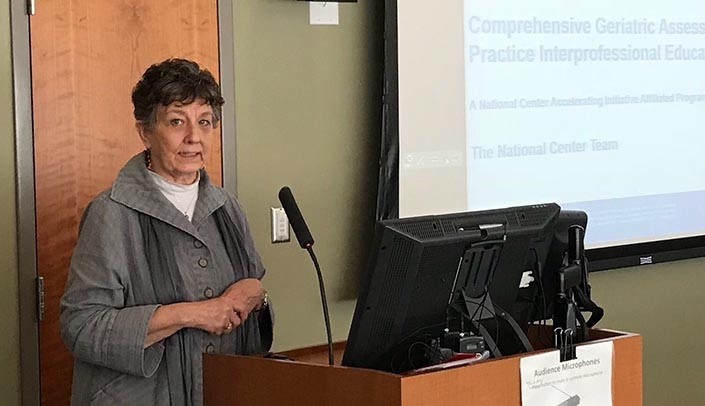Moving patients from one facility to another is one of the most risky times in patient care.
Medication mistakes are common and sometimes can be deadly. Patients might not get the right kinds or doses of medication — or no medication at all.
With the help of a $100,000 grant funded last year, UNMC students are getting education and experience with health professionals and staff in community health facilities to prevent this from happening.
One of the impetuses for the grant is a study by the U.S. Office of the Inspector General that cited a loss of $2.8 billion in 2014 because of poor transitions from hospitals into skilled nursing facilities, said Claudia Chaperon, Ph.D., principal investigator of the grant and associate professor, UNMC College of Nursing.
Recently, funders of the grant, the National Center for Interprofessional Practice and Education, made a site visit at UNMC to assess progress on goals and maximize the outcomes of the Comprehensive Geriatric Assessment Program and Interprofessional Education initiative.
The initiative involves teams of UNMC pharmacy and adult gerontology nurse practitioner students, and clinic and staff partners from the Rehabilitation Center of Omaha and Ambassador Health of Omaha. The teams are learning and training together to reduce medication errors in older patients transitioning from the hospital to inpatient skilled nursing care.
Dr. Chaperon said the site visit went well. “It was an opportunity to work with senior leaders and our team to develop further,” Dr. Chaperon said. “We learned our team is doing a great job in accomplishing initiatives of the grant.
“Our excitement continues to build as the teams develop relationships and interprofessional team skills to prepare for a clinical demonstration of better admissions. The grant program is filling the transitional care gap by preparing effective interprofessional teams to address the critical needs for improved safety. Much progress has been made.”
Devin Nickol, M.D., UNMC assistant dean for interprofessional education (IPE), said the initiative is important in progressing forward in IPE.
“It’s a timely, relevant project, a very important topic today in health care. The national center cited UNMC’s project as a model for a case study on how well it can be done. We plan to invite medical students to participate in the next year. We’re interested in making it part of the curriculum.”
